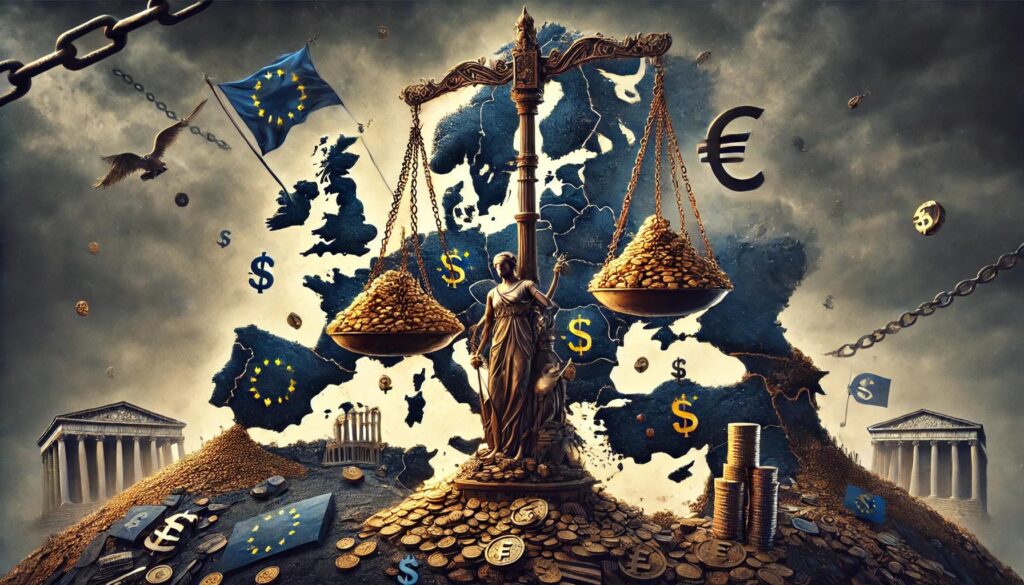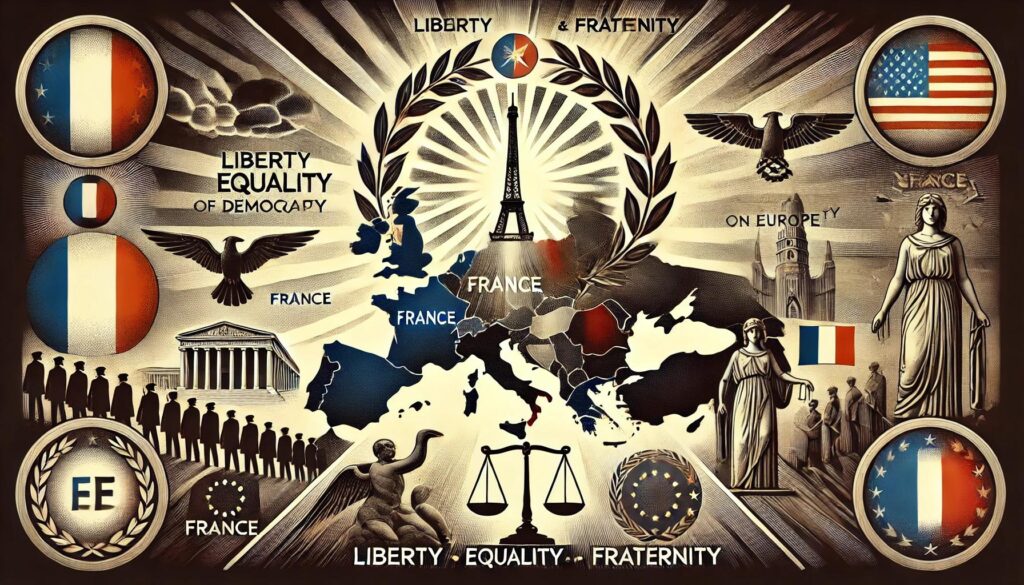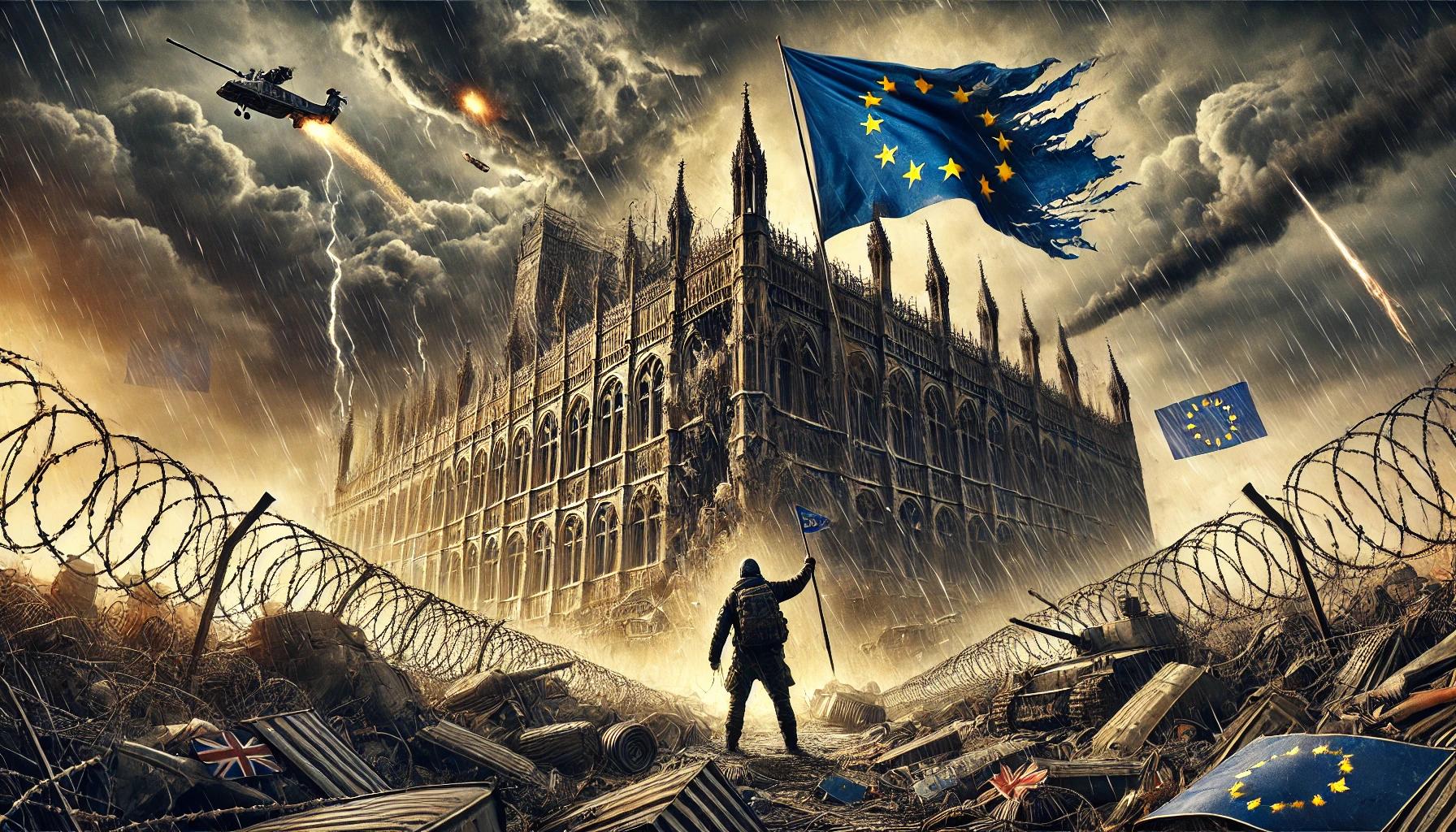US President Joe Biden said he had done the best for America (while dropping tears), insinuating how tough it is to be a US president. All those big banks, super-rich families, multinational lobbyists more powerful than he is. But we should highlight this: he has said that Trump would be a threat for the US democracy. But if you are a European, you read it always in media (and yes, between the lines): will the US and Western democracy survive?
How does the US democracy work?

A lot has been written of how the US democracy works. Call me an enemy of the super-rich, but I wrote of how the super-rich US groups may be benefitial for the democracy in the US.
Henry Ford, who was a member of the Freemasons, proclaimed in 1940 that the Freemasons (the super-rich) were the best for the balance of power in the United States. Thus preserving democracy.
Also, imagine if the bipartisan system (with its super-rich groups backers) didn’t exist, the chaos would ensue. New parties would be detrimental to US citizens (of course people voting for them), with extremism and nationalism as it could emerge. This could possibly destabilize the whole world. Of course, people didn’t learn how to vote (sic!), and that serves the established educational system.
The mutually interconnected banks, intermarried super-rich families’ members, multinational corporations and, of course, a lot and lot space for money and power struggle.
Democracy pays off (literally)
The super-rich support democracy because it serves their interests (some of the super-rich, while unbelievable, support democracy as their value system).
Democracy ensures stability. Instability and authoritarian regimes threaten wealth through economic unpredictability or nationalization of assets. It legitimizes their power by creating an illusion of fairness. Public participation obscures the elite’s influence through lobbying and media control.
Globalization thrives under democratic systems, benefiting multinational corporations. Democracies align with free trade and intellectual property protections, which the wealthy prefer. They also minimize revolutionary threats. Elections and reforms pacify discontent, preventing radical societal changes.
Democracies favor neoliberal policies. Privatization, deregulation, and tax cuts disproportionately benefit the wealthy. They prefer democracy because it avoids risks of authoritarianism. Authoritarian regimes could confiscate wealth or destabilize markets. Instead, democracies provide predictable rules.
Finally, democracy enables cultural dominance. The super-rich use media, education, and think tanks to shape public opinion. This ensures their values align with societal goals.
US democracy will likely survive Donald Trump: believe it or not
While Mr. Donald Trump really doesn’t mind if there is democracy or not, we must admit the obvious. It is the super-rich behind him who make that whole show.
Some may object that POTUS is really powerful (compared to the American-given little power a German chancellor has), but the super-rich’s power with the ongoing neoliberal agenda has grown so much. So their power is even stronger.
While their battles will be tough, deviating a little into autocracy type of rule, they know the money and power at stake are really huge and they resort not to lose them.
Executive, judicial and legislative power do what the super-rich want
Congressmen, congresswomen or senators have just a very few topics they cannot be bribed by lobbyists (they spend most of the time calling with lobbyists to gain monetary means for getting reelected). All they do is what the lobbyists want and what the super-rich’s planted people desire. For example, people-minded products of the honorable institutions:
The Protect IP Act (PIPA) and Stop Online Piracy Act (SOPA), pushed by Hollywood and intellectual property lobbies, sought to combat online piracy but risked censoring the internet and stifling innovation. Despite massive public protests, Congress advanced these bills under heavy lobbying pressure, prioritizing corporate interests over free speech.
The 1996 Telecommunications Act, influenced by telecom and media giants, promised consumer benefits but led to industry consolidation. This reduced competition, raised prices, and concentrated media control, clearly favoring corporate profits over public interest. Just to name a few.
Will the (European) Western democracy survive? Not so sure

As a man who was born after the fall of communism in Czechoslovakia, I am deeply appalled by the possibility of losing our even flawed democracy.
Now what’s the deal? Global banks such as Goldman Sachs, JPMorgan Chase, and Deutsche Bank are interconnected through ownership stakes, shared board members, and secret agreements. They control global finance, ensuring that a small elite group benefits while the rest of the world remains economically dependent. And not only they are in such constellations that democracy is disappearing, but money and power mean more.
European democracies too costly to the rich. More of neoliberalism must continue to expand
The existence of European democracies presents significant challenges to the interests of the super-rich. These systems are built on principles that often conflict with the consolidation of wealth and power.
Since the 2007–2008 financial crisis, the world hasn’t fully recovered, globalization has shifted and people may resort to voting left which is detrimental to the elites (so the international power cliques maintain some center-right type of politics).
European democracies maintain strong regulatory frameworks. Anti-trust laws, environmental regulations, and taxation policies frequently curb the unchecked expansion of corporate and individual wealth. These structures stand in the way of monopolistic practices and unlimited profit generation.
Social welfare systems further complicate the matter. Many European countries prioritize public healthcare, education, and social support. These policies require wealth redistribution, often through progressive taxation, which diminishes the concentration of wealth at the top.
Competition laws in the European Union actively resist monopolies. These laws are designed to protect consumers and smaller businesses, preventing dominant corporations from controlling entire markets. For the super-rich seeking absolute market power, such laws are a direct obstacle.
Equality, fairness, social nets? Forget about it, Western democracy may not survive it
Cultural values across Europe emphasize equality and fairness. Worker rights, inclusive policies, and protections against exploitation undermine attempts to establish hierarchical structures based on wealth. These values challenge any effort to centralize economic power in the hands of a few.
Democratic processes themselves are unpredictable. Free elections allow grassroots movements to gain traction, often leading to policies that prioritize public welfare over corporate interests. This creates an environment where long-term dominance is harder to secure.
European nations also tend to resist certain aspects of globalization. Many work against tax havens, regulate capital movement, and enforce labor protections. These measures limit the ability of the super-rich to exploit global loopholes for personal gain.
Finally, the decentralized nature of European governance adds another layer of complexity. National sovereignty, coupled with a collective emphasis on accountability and transparency, contrasts with the interests of those who may prefer global systems that centralize power and reduce scrutiny.
In essence, the structures, values, and policies of European democracies inherently resist the concentration of power and wealth. These systems act as a counterbalance, protecting public interest over private dominance.
Why should France do more?

European democracies face growing challenges, both from within and from external forces. France, as a historical leader in democracy and a central member of the European Union, must take the lead in preserving these systems. Its actions are critical for several reasons.
France (equipped like the US in terms of soft and hard power, just five times smaller) represents the ideals of liberty, equality, and fraternity. These values are the foundation of European democracy. Strengthening them in France sends a clear signal across the continent, reinforcing shared principles.
Authoritarian regimes increasingly seek to destabilize European democracies. France, with its global influence, can counter these efforts through diplomacy, economic pressure, and active support for democratic governance.
The European Union itself relies on strong democratic foundations. France, as a founding member, must lead efforts to unify EU policies, ensuring democracy remains at the core of its governance.
Populism and division are spreading across Europe. These movements exploit inequalities and mistrust in institutions. France can address these issues at home and push for EU-wide solutions to reduce polarization.
Eastern European democracies face unique vulnerabilities. France should offer them economic, political, and logistical support, helping to secure their democratic institutions against authoritarian tendencies.
Economic disparities within Europe fuel discontent and weaken democracy. France’s strong economy allows it to push for fairer EU economic policies, fostering equality and stability across member states.
Media freedom
Media freedom is under threat in many European nations. France must champion free and independent journalism, regulate disinformation, and promote transparency to protect democratic discourse.
The survival of European democracies requires unity. France’s diplomatic strength can help forge a cohesive European response to internal and external threats, ensuring collective resilience.
Public disengagement weakens democratic systems. France should lead by example, adopting reforms that encourage participation, transparency, and civic education to empower citizens.
Long-term stability depends on addressing global challenges like climate change and technological disruption. France must lead in crafting EU strategies that protect democracy while adapting to these changes.
France’s leadership is essential. European democracies are interconnected, and their preservation requires strong, proactive actions. A stable, democratic Europe is vital for its citizens and for global stability.
Will European democracies make it? Well, we don’t know

Would-be autocracies in Slovakia and Hungary are nothing but a foretaste. The real totalitarianism or rather autocracy would be different.
If European democracies were replaced by autocracy or totalitarianism, the consequences would be profound and far-reaching. The collapse of democratic systems would fundamentally alter the political, social, and economic landscape of the continent.
Centralized power would dominate every aspect of governance. Autocratic regimes rely on a concentration of authority, stripping citizens of their ability to participate in decision-making. Elections, if they exist at all, would become symbolic, designed to legitimize those already in control.
No civil liberties and freedoms of speech
Civil liberties would vanish. Freedoms of speech, assembly, and press would be suppressed. Media outlets would fall under state control, spreading propaganda and silencing dissent. Surveillance systems would expand, ensuring compliance and instilling fear.
Economic systems would shift towards cronyism. Without accountability, wealth and resources would flow to those loyal to the regime. Corruption would thrive, undermining innovation and fair competition. The lack of transparency would deepen inequality and foster economic stagnation.
Cultural diversity and identity would face erasure. Totalitarian states often impose uniformity, suppressing regional languages, traditions, and histories. Cultural expression would be limited to what aligns with state ideology, destroying centuries of European heritage.
Social cohesion would break down. Fear and mistrust would replace dialogue and cooperation. Citizens would turn against one another, either out of desperation or coercion, as regimes often rely on informants to maintain control.
International relations would deteriorate. European unity depends on shared democratic values. Autocratic governments, prioritizing self-interest and power consolidation, would fracture alliances. Conflicts over borders, trade, and influence would likely escalate, destabilizing the region.
Molded education
Education and knowledge would be manipulated. Schools and universities would become tools for indoctrination, promoting state ideology and suppressing critical thinking. Independent research and academic freedom would disappear.
Resistance would become dangerous. Activists, journalists, and political opponents would face imprisonment, exile, or worse. Fear of persecution would deter opposition, leaving the regimes unchallenged.
Generational freedoms would be lost. A shift to autocracy or totalitarianism could take decades to reverse. Younger generations, growing up under such regimes, would know only repression and control, with no memory of the liberties once enjoyed.
The transition to autocracy or totalitarianism would not just end democracy. It would dismantle the very fabric of European society. A continent once defined by freedom, diversity, and progress would face oppression, uniformity, and decline. The stakes for preserving European democracies could not be higher.
If the US fails, Europe follows
While Americans won’t likely experience deep totalitarianism, if they do, we (Europeans) would likely follow because of the aforementioned interconnected banking system and money flows.
They asked one Czech politician what is the most important in politics. He responded: “The sum of money.”
How to defend our democracies?
Defending democracy from ongoing authoritarianism requires vigilance, courage, and collective action. Citizens must act decisively to counter the erosion of freedoms and prevent authoritarian regimes from consolidating power.
The first step is to recognize the warning signs. Authoritarians undermine democracy incrementally, often through attacks on the press, manipulation of elections, or centralizing power under the guise of reforms. Citizens must resist these changes at every stage and refuse to normalize undemocratic actions.
Collective action is essential. Authoritarianism thrives on division, so forming broad coalitions across social and political lines is critical. These alliances strengthen resistance and prevent regimes from isolating opposition groups. Local communities play a key role by organizing grassroots movements and fostering mutual support.
Peaceful protests
Nonviolent resistance is a powerful tool. Peaceful protests, strikes, and acts of civil disobedience disrupt authoritarian control and draw attention to abuses. Symbolic acts, like wearing specific colors or displaying protest symbols, can signal resistance while minimizing confrontation. Economic pressure, such as boycotts and workplace strikes, challenges the regime’s financial stability.
Independent institutions must be protected. Free media, courts, and watchdog organizations are vital for holding authoritarian governments accountable. Supporting these institutions ensures that checks and balances remain intact. Documenting abuses is equally important, preserving evidence for advocacy and eventual accountability.
Civic education is another cornerstone. Citizens need to understand democratic principles, their rights, and the dangers of authoritarianism. This knowledge empowers them to resist effectively and inspire others. Schools, community programs, and public campaigns should prioritize teaching these values.
Make the surveillance more difficult
Technology plays a critical role in modern resistance. Secure communication tools and encrypted messaging protect activists from surveillance. Online platforms can be used to share verified information, debunk propaganda, and organize protests, but citizens must remain vigilant against disinformation and digital manipulation.
Authoritarian regimes often target vulnerable groups to consolidate power. Standing in solidarity with marginalized communities is crucial to countering divide-and-rule tactics. Building inclusive movements strengthens resistance and aligns with the democratic principle of equality.
International support can amplify efforts. Collaborating with global human rights organizations and exposing abuses on international platforms increases pressure on authoritarian regimes. Economic sanctions targeting regime leaders and enablers can further undermine their grip on power.
Long-term commitment is essential. Defending democracy is not a single event but an ongoing process. Citizens must document abuses, advocate for reforms, and build a vision for democratic governance that addresses the grievances authoritarianism exploits. Engaging younger generations ensures the continuity of resistance and the preservation of democratic values.
Ultimately, resisting authoritarianism requires unwavering dedication to freedom, justice, and equality. By standing together and taking strategic, peaceful action, citizens can protect their democracy and ensure a better future for all.
Will US and Western democracy survive? It is up to us

If every citizen stood up to injustice, freedom restrictions, and democracy falling apart, no such things would even occur. Let’s start by getting rid of clientelism.
But since citizens are sheep prone to being trapped by every possible distraction the super-rich come up with to show and lure the sheep, nothing changes.
The saddening part is seeing people doing nothing, just like in Russia. But after real autocracies start to rule, they want to overturn them.
Just like in the communist coup in 1948 in Czechoslovakia, people did nothing. But when tanks arrived from the Soviet Union in 1968, they went crazy. Too late.

Leave a Reply